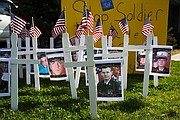The crosses they bear
COEUR d'ALENE - The small American flags flying over the white crosses in Jennifer McNulty's front yard Thursday accompanied photos of 22 servicemen and women who have taken their own lives.
She pointed to the picture of a handsome man in a green Army jacket in the front row.
"This is my husband," she said. "He died Oct. 31, 2012."
Jennifer's husband, Sgt. Wyatt McNulty, suffered from severe post-traumatic stress disorder and a traumatic brain injury. He was in the military for 11 years, serving in Kosovo and suffering the brain injury during training before being deployed to Iraq. He was out for seven years before his death.
"Ever since he came home from Iraq he wasn't the same," Jennifer said. "He was getting sick a lot, and the (Veterans Affairs) wasn't really doing anything to figure out what was making him sick. They were just, like I said, putting a Band-Aid over it and sending him home."
Jennifer, who serves as the treasurer for the Ladies Auxiliary at Veterans of Foreign Wars Post 889, wore a special T-shirt and bracelet honoring her husband as she glanced at the many photographs of fallen heroes. She married Wyatt in 1994.
"The year he passed, we had just celebrated our 18th wedding anniversary," she said. "This last July would have been our 20th. I was 18, right out of high school."
She said she didn't notice a huge change in Wyatt's personality leading up to his death, but he did experience mood swings. She said they discussed the PTSD with their son and daughter, who are now 14 and 18.
"The mood swings were harsh on the kids," she said. "I always would try to be really honest with them and say, 'That's not really your dad, it's just he's sick. Now, we go to church and just lean on each other."
Jennifer placed the flags, crosses and photos in her yard Thursday morning to answer an Internet challenge issued by StopSoldierSuicide.org, which asked people across the nation to generate awareness about the realities of suicide and how it affects military families.
"It was not something that I ever thought would happen," she said. "He had a friend commit suicide when they were teenagers, and he was mad at him forever, so it was not something I ever expected."
According to information on www.stopsoldiersuicide.org, 22 veterans and one active-duty soldier commit suicide every day and veterans can be three times more likely to become suicide victims than civilians.
"These guys deserve a lot better than what they're getting," Jennifer said. "Right now, they're getting the Band-Aid effect, and we actually need something that's going to help."
Jennifer said she has become friends with other military widows and is involved with Tragedy Assistance Program for Survivors (TAPS), a support network which cares for military families that have suffered a loss.
"If there are military widows who are out there trying to get through it on their own, call TAPS," she said. "TAPS is the most wonderful organization; I'm so glad I found them. We always say, 'They're the best friends I never wanted but I'm so glad I have.'"
Bret Bowers, public affairs officer for the Mann-Grandstaff VA Medical Center in Spokane and spokesman for the new outpatient clinic in Coeur d'Alene, said a veteran anywhere and any time who is having a mental health issue or crisis can call the Veterans Crisis Line at (800) 273-8255.
"We have the ability to help them and we have the desire because it's our mission and they deserve it," Bowers said. "They've earned it."
Jennifer recommended people who have soldier friends should check on them frequently.
"PTSD causes you to cut off everything and everybody in your life," she said. "It completely changes the way you socialize. Just keep on them. If you have friends that are soldiers, ex-soldiers that are struggling with PTSD, just call them up once in a while, have them come do something. Keep trying. They're going to say no, but keep trying."
National Suicide Prevention Hotline: 1-800-273-8255
Info: www.stopsoldiersuicide.org, www.facebook.com/stopsoldiersuicide, www.taps.org.
Help prevent suicide
September is National Suicide Prevention Month. According to information from The Idaho Suicide Prevention Hotline, Idaho has the eighth-highest suicide rate in the country and suicide is the second-leading cause of death for adolescents and young adults in Idaho.
The hotline (1-800-273-TALK) has answered its 3,000th call and has added Friday and Saturday overnight shifts. The ISPH trains volunteers, both laypersons and professionals, to become crisis phone workers. Volunteers receive 40 hours of training and apprenticeship and commit to one four-and-a-half-hour hotline shift per week for one year. The hotline offers callers emotional support, assessment of suicide risk, crisis intervention to those in imminent danger, connections to local services and follow-ups for those who exhibit suicide risk factors. To learn more or make a donation, visit ISPH's website, www.idahosuicideprevention.org.



